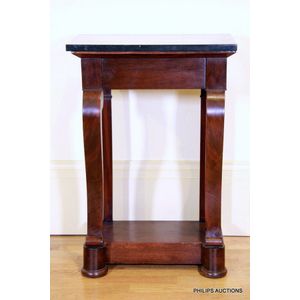Louis Philippe Mahogany Console Table with Marble Top
You must be a subscriber, and be logged in to view price and dealer details.
Subscribe Now to view actual auction price for this item
When you subscribe, you have the option of setting the currency in which to display prices to $Au, $US, $NZ or Stg.
- Mahogany - Mahogany is a dense, close grained red-coloured timber from the West Indies and Central America. It was first imported into Europe in the the early 18th century and its use continued through the 19th century. It was popular for furniture making because of its strength, the wide boards available, the distinctive grain on some boards, termed flame mahogany and the rich warm colour of the timber when it was polished.. The "flame" was produced where a limb grew out from the trunk of the tree, and this timber was usually sliced into veneers for feature panels on doors, backs and cornices.
Some terms used to describe mahogany relate to the country from which it originally came, such as "Cuban" mahogany, "Honduras" mahogany etc. However unless the wood has been tested the names assigned are more a selling feature, rather than a true indication of the timber's origin. - Pilasters - In furniture a pilaster is a flattened column-like detail
applied to furniture. It is similar to a pilaster in architecture, but it is
typically smaller and less ornate. Pilasters are often used to decorate the
fronts of bookcases, cabinets, and other pieces of furniture. Pilasters can be
made of wood, metal, or other materials. They can be fluted, carved, or plain.
Pilasters are often used to add a touch of elegance and sophistication to
furniture. - Platform Base - Flat-surfaced bases supporting the pedestals of dining tables and some other smaller occasional tables, including console and pier tables. Introduced during the Regency period, they continued in popularity throughout the 19th century. On tables, platform bases are usually of triform, or three-cornered shape, supported by bun, turned or carved claw feet. They may be either of veneered box-like construction, or formed from the solid timber.
- Frieze - An architectural term denoting the flat, shaped or convex horizontal surface of furniture, between the architrave and the cornice, usually found on a cabinet or bookcase, or on desks and tables where it may include drawers, the area between the top and the legs. In ceramics, the term refers to the banding, of usually a repeating pattern, on the rims of plates and vases.
- Circa - A Latin term meaning 'about', often used in the antique trade to give an approximate date for the piece, usually considered to be five years on either side of the circa year. Thus, circa 1900 means the piece was made about 1900, probably between 1895 and 1905. The expression is sometimes abbreviated to c.1900.
This item has been included into following indexes:
Visually similar items

Regency mahogany pier table, c. 1830, the white rectangular marble top above two carved scrolling side supports raised on a rectangular base, with mirrored back, height 98 cm width 139 cm depth 46 cm. Provenance: The Estate of the late Janis Salisbury, Syd

An ornately carved mahogany console with an antique stone plate. 98 cm high, 136 cm wide, 68 cm deep

A Victorian mahogany twin pedestal sideboard, three drawers over two doors, 100 x 205 x 64 cm

An oak table in the 18th century manner, 20th century, with maker's mark for Gillow & Waring, a sofa style table having a stepped top, the timber with vibrant figuration above two panelled drawers with burr inserts and brass drop pulls, columnar and turned
